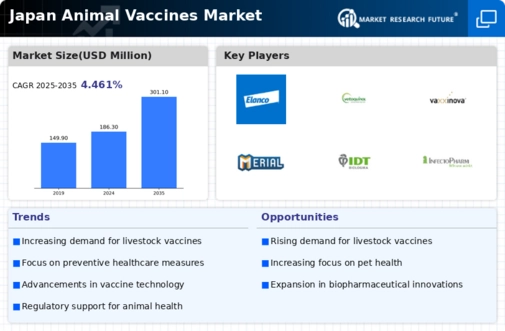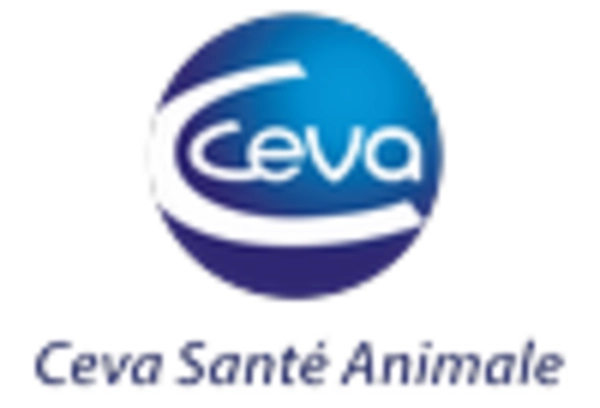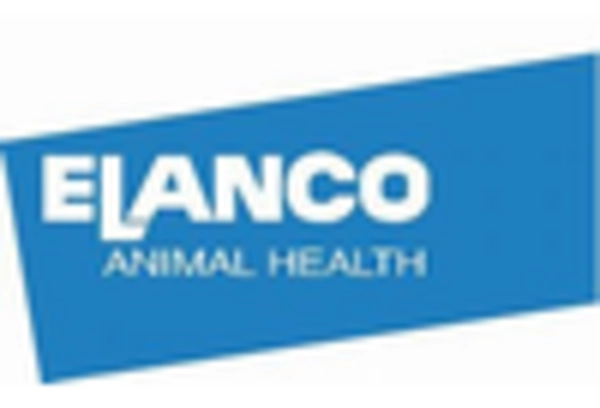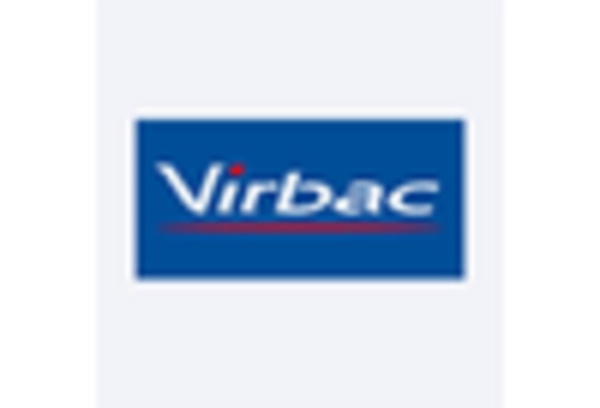Rising Pet Ownership
The increasing trend of pet ownership in Japan appears to be a significant driver for the animal vaccines market. As more households adopt pets, the demand for veterinary services, including vaccinations, is likely to rise. According to recent statistics, approximately 40% of households in Japan own pets, with dogs and cats being the most popular. This growing pet population necessitates a robust vaccination program to ensure the health and well-being of these animals. Consequently, veterinarians are expected to recommend vaccinations more frequently, thereby propelling the animal vaccines market. Furthermore, the emotional bond between pet owners and their animals may lead to a willingness to invest in preventive healthcare, including vaccines, which could further stimulate market growth.
Emerging Zoonotic Diseases
The emergence of zoonotic diseases in Japan is likely to have a profound impact on the animal vaccines market. As public health concerns regarding diseases that can be transmitted from animals to humans increase, there is a growing emphasis on vaccinating pets and livestock. The Japanese government has been proactive in addressing these health risks, which may lead to increased funding for vaccine development and distribution. For instance, diseases such as rabies and avian influenza have prompted heightened awareness and preventive measures. This focus on zoonotic diseases could drive demand for innovative vaccines, thereby expanding the animal vaccines market. The potential for outbreaks may also encourage pet owners and farmers to prioritize vaccination, further enhancing market dynamics.
Consumer Awareness and Education
Consumer awareness and education regarding the importance of vaccinations for pets and livestock appear to be critical drivers for the animal vaccines market. In Japan, there is a growing recognition among pet owners about the necessity of preventive healthcare, including vaccinations. Educational campaigns by veterinary associations and animal welfare organizations may contribute to this trend, emphasizing the health benefits of vaccinations. As pet owners become more informed, they are likely to seek veterinary services more frequently, leading to increased demand for vaccines. This heightened awareness could potentially transform consumer behavior, making vaccinations a standard part of pet care, thereby positively impacting the animal vaccines market.
Government Initiatives and Funding
Government initiatives and funding aimed at improving animal health are likely to be a driving force in the animal vaccines market. The Japanese government has implemented various programs to support veterinary services and promote vaccination among livestock and pets. For example, subsidies for vaccination campaigns and educational programs for pet owners may encourage higher vaccination rates. Such initiatives not only enhance public awareness but also provide financial support for vaccine development and distribution. As a result, the animal vaccines market may experience growth due to increased accessibility and affordability of vaccines, ultimately benefiting both animal health and public safety.
Advancements in Veterinary Medicine
Advancements in veterinary medicine are likely to play a crucial role in shaping the animal vaccines market. Innovations in vaccine technology, such as the development of recombinant vaccines and mRNA-based solutions, may enhance the efficacy and safety of vaccinations for animals. These advancements could lead to a broader range of vaccines available for various diseases, thereby increasing the overall market size. In Japan, the veterinary sector is witnessing a shift towards more sophisticated medical practices, which may include the adoption of these new vaccine technologies. As veterinarians become more equipped to handle complex health issues, the demand for effective vaccines is expected to rise, positively influencing the animal vaccines market.
















